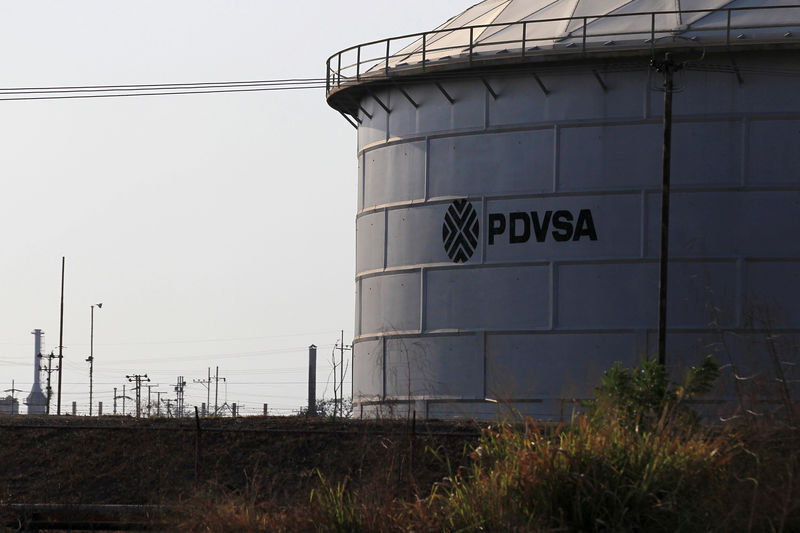By Marianna Parraga
(Reuters) - Venezuela's state-run PDVSA exported 1.06 million barrels per day (bpd) of crude and refined products last month, an eight percent increase from March as the sanctioned company managed to boost shipments to China, according to Refinitiv Eikon data.
The U.S. government imposed the toughest sanctions yet on PDVSA in late January, causing an abrupt disruption in flows of Venezuelan oil to the United States, formerly the OPEC-member country's first destination for crude exports.
Venezuela's overall exports fell 40 percent in the first month after sanctions, but they have remained steady since mostly due to shipments to Chinese and Indian buyers, according to the data. PDVSA did not respond to a request for comment.
However, that looks set to change in May, as the period for U.S. firms to finish ongoing deals with PDVSA expired on April 28. Loading programs - which refer to scheduled exports - look thin for May, according to PDVSA's internal documents and the Eikon data, suggesting shipments could drop in coming weeks.
After April 28, transactions to purchase petroleum or fuel from PDVSA or its controlled entities involving U.S. persons, the U.S. financial system or U.S. commodity brokers are prohibited by the U.S. Treasury Department, including swaps and non-cash transactions.
The United States imposed sanctions to cut off President Nicolas Maduro's main source of revenue. Many Western governments have recognised Venezuela's congress head Juan Guaido as the country's rightful leader, but the opposition has not yet been able to oust Maduro.
In April, PDVSA shipped a total of 35 oil cargoes, mostly from the country's Jose port. The main destination of the shipments was China, which absorbed 337,000 bpd, almost a third of Venezuelan exports; followed by India with 27 percent and Europe with 10 percent, according to the data.
State-run China National Petroleum Corp (CNPC) and its subsidiaries are PDVSA's largest customers; they receive Venezuelan oil as repayment for billions of dollars in loans extended by China to Venezuela in the last decade.
Venezuelan oil exports have remained stable after sanctions partially due to inventory drains. The country's crude stocks have fallen by 3.8 million barrels since late February to around 32 million barrels, according to consultancy Kpler.
PDVSA's largest customer in India, Reliance Industries, last month said it was buying Venezuelan oil from third parties, including Russia's Rosneft, as the deals were not violating sanctions.
IMPORTS OF REFINED PRODUCTS
Since the measures were issued, Rosneft has increased swap deals with PDVSA to exchange PDVSA's oil for imported fuel needed in Venezuela. In April, Rosneft took at least 160,000 bpd of Venezuelan crude and supplied around 29 percent of the refined products the country bought, according to the PDVSA documents and the Eikon data.
PDVSA last month averaged 51,335 bpd in exports to Cuba even after specific sanctions on those shipments. The most recent export, a 300,000-barrel cargo of diesel on Venezuela-flagged tanker Manuela Saenz, left Amuay terminal at the end of April for the Caribbean island, according to Refinitiv Eikon and two shipping sources.
Venezuela imported 192,535 bpd of oil and refined products in April, down 12 percent from March. That included a 976,000-barrel cargo of Nigeria's Agbami crude, to be used for diluting extra heavy oil output from two projects at the Orinoco Belt, according to a PDVSA document seen by Reuters.
This is the first time Venezuela has imported crude in four years. PDVSA has been a regular buyer of imported oil in recent years for feeding refineries in Curacao and Cuba, but it stopped importing crude for domestic use in 2015 when deals for buying Algerian and Russian crudes ended.
Since sanctions banned U.S. firms from selling diluents to PDVSA, the company has been struggling to find alternatives to dilute its extra heavy oil and produce exportable grades. In April, it discharged only one cargo of imported naphtha, and three more supplied by Rosneft are waiting to discharge in May.
